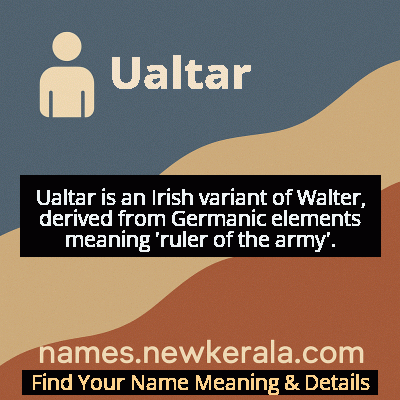Ualtar Name Meaning & Details
Origin, Popularity, Numerology Analysis & Name Meaning of Ualtar
Discover the origin, meaning, and cultural significance of the name UALTAR. Delve into its historical roots and explore the lasting impact it has had on communities and traditions.
Name
Ualtar
Gender
Male
Origin
Irish
Lucky Number
1
Meaning of the Name - Ualtar
Ualtar is an Irish variant of Walter, derived from Germanic elements meaning 'ruler of the army'.
Ualtar - Complete Numerology Analysis
Your Numerology Number
Based on Pythagorean Numerology System
Ruling Planet
Sun
Positive Nature
Leaders, ambitious, highly driven, self-reliant, innovative.
Negative Traits
Overly aggressive, domineering, impatient, selfish.
Lucky Colours
Red, orange, gold.
Lucky Days
Sunday.
Lucky Stones
Ruby, garnet.
Harmony Numbers
2, 3, 9.
Best Suited Professions
Entrepreneurs, managers, engineers.
What People Like About You
Courage, determination, leadership.
Famous People Named Ualtar
Ualtar Ó hUallacháin
Gaelic Chieftain
Led successful resistance against Norman invaders in County Cork
Ualtar Mac Suibhne
Military Commander
Commanded Gallowglass mercenaries for Irish clans during the Tudor conquest
Ualtar Ó Dálaigh
Poet and Scholar
Preserved ancient Irish texts and composed battle poetry for Gaelic nobility
Ualtar de Búrca
Landowner and Politician
Maintained Irish cultural traditions while navigating English colonial administration
Name Variations & International Equivalents
Click on blue names to explore their detailed meanings. Gray names with will be available soon.
Cultural & Historical Significance
During the Gaelic Revival of the 19th and 20th centuries, Ualtar experienced renewed interest as Irish intellectuals sought to reclaim and preserve native linguistic forms. The name carries echoes of Ireland's warrior tradition while also embodying the resilience of Irish culture in absorbing external influences while maintaining distinct identity. Historical records show Ualtars often served as military leaders, landowners, and cultural preservers during periods of English domination, making the name symbolic of Irish resistance and cultural endurance.
Extended Personality Analysis
Individuals named Ualtar are typically perceived as possessing strong leadership qualities combined with practical intelligence. They often exhibit the 'strong fighter' essence of their name through determination and resilience rather than aggression. Ualtars tend to be strategic thinkers who approach challenges methodically, reflecting the military commander connotations of their name's meaning. They frequently demonstrate loyalty to family and community, a trait that aligns with traditional Irish values of kinship and solidarity.
Many Ualtars display a blend of traditional values with modern adaptability, capable of honoring heritage while navigating contemporary complexities. Their strength often manifests as emotional fortitude and the ability to persevere through adversity, making them reliable anchors in difficult situations. While they can be reserved initially, Ualtars typically form deep, lasting relationships and are known for their steadfastness once trust is established. This combination of strategic thinking, loyalty, and quiet strength makes Ualtars natural leaders in both professional and personal contexts.
Modern Usage & Popularity
In contemporary Ireland, Ualtar remains a relatively uncommon but culturally significant choice. While the anglicized 'Walter' is more frequently encountered, Ualtar has seen a modest resurgence among families seeking to reconnect with Irish linguistic heritage. According to the Central Statistics Office of Ireland, approximately 120 individuals currently bear the name Ualtar, with slight increases noted during Celtic cultural revival periods. The name is particularly popular in Gaeltacht regions and among Irish language enthusiasts. Modern Ualtars often work in education, cultural preservation, or community leadership roles, continuing the name's association with guidance and strength. The name's rarity in the 21st century adds to its distinctive appeal for parents seeking unique yet historically grounded names for their children, though it remains outside the top 500 most popular Irish names.
Symbolic & Spiritual Meanings
Symbolically, Ualtar represents the intersection of strength and wisdom, embodying the ideal of the philosopher-warrior. The name carries connotations of protective leadership rather than aggressive domination, suggesting someone who fights for causes rather than personal glory. In metaphorical terms, Ualtar symbolizes cultural resilience—the ability to absorb external influences while maintaining core identity, much like Ireland itself. The name evokes images of ancient standing stones: enduring, grounded, and connected to heritage. It represents the bridge between tradition and adaptation, between ancestral wisdom and contemporary challenges. Ualtar also symbolizes the quiet strength found in loyalty and commitment, the power that comes from deep roots and steadfast principles rather than flashy displays of force. This makes the name emblematic of enduring values in a changing world.

